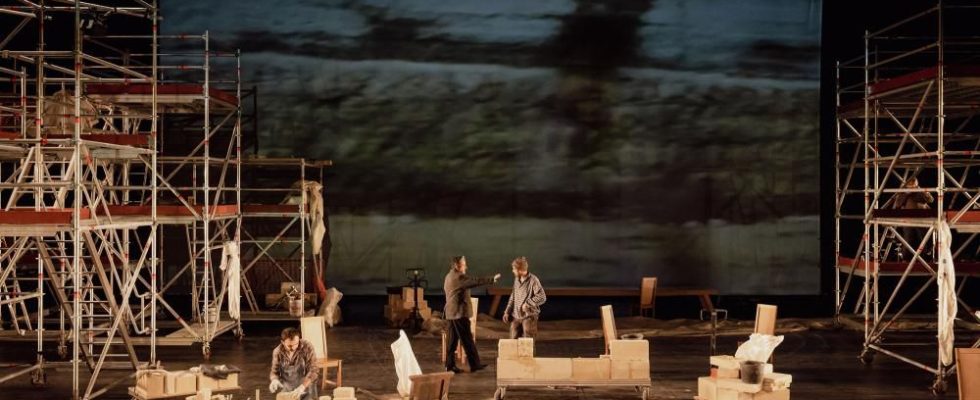Since he escaped death at the age of 23, Amos Gitaï has directed so many films, shows, written so many books and caused so many scandals that that evening, on the stage of the Théâtre de la Colline, during of the premiere of House, when Jeanne Moreau appeared on the backstage screen, and she started talking, completely out of sync, I said to myself, “Hey, what else has he come up with?” At first I thought it was intentional, or at least, if it was a failed act, that it was successful. Then I looked in my head for the biblical reference for this desynchronism: is this how the dead speak to the living, in the Torah? The word being at the beginning of everything, by speaking beside his mouth, would Yahweh have shown Abraham the inanity of the image, always behind the word?
If it was really unintentional, the stage manager would soon interrupt the performance, apologize flatly, and we would resume everything after having failed the soundtrack. Nay, the screening of this interview excerpt continued, making Jeanne Moreau seem stranger than ever. Nobody had the impoliteness to protest as it would have happened in a movie theatre, thus confirming that we were indeed in the theatre, in front of a live performance, where, by the grace of this discrepancy between sound and image, we were deep in doubt, one part of the room thinking something the other part disagreed with. And that was exactly the subject of the play… and of Amos Gitaï’s work.
An unfindable peace
In fact, the play had started before we entered the room: the two Palestinian stone-cutting workers had been on stage for a while, hammers and chisels striking the three blows until, according to the expression consecrated, the curtain rises.
The wall that the Palestinian workers are building is that of the house that the Jews stole from them in 1948. That they stole from their parents, which is not quite the same. It’s no less painful, and perhaps even more cruel than for their parents who seem to have resigned themselves to it, tired of complaining. But for the sons, to the shame of the nakba (the catastrophe) which they did not experience, is added the humiliation of having to, in order to earn a living, add a floor to the building of misfortune, which has become the temple of their hatred.
The story of this house, the architect Amos Gitaï has been telling for more than forty years. His first film, in 1980, was already called House. The evocation of this drama makes Dora cry, next to me, without a sound. She will end up blowing her nose loudly when the one who lives in this house, a young Jew who is half French, half Dutch and totally Israeli, while giving orders to the workers, claims the right to live in this house because his parents died in Auschwitz. . In the souk of specious arguments, the bosses are always obnoxious.
We recognize the dystopian obsession that presides over the works of Amos Gitaï, which are never meetings or masses. Rather concerts, if we are to believe the place he gives to music. It is indeed with iron bars, pieces of wood and all sorts of warlike objects that the protagonists, Israelis and Palestinians, whether Jews, Christians or Muslims, beat rhythmically on the metal pipes of the scaffolding. It’s cathartic, but peace remains elusive.
A new enigma then arises at the end of the demonstration. It disturbs as much as the desynchronism of Jeanne Moreau, it is the absence of intrigue. Gitaï could have imagined a love story, a heinous crime, the discovery of an archaeological, reconciling treasure. No. No concessions. As if, at the height of despair, the situation of the Palestinians had to remain both tragic and insoluble, and unfit to offer, on a Parisian stage, a tragedy.
